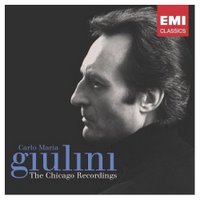 In the history of music making there are quite a few examples of great partnerships. The partnership between Chicago Symphony and Carlo Maria Giulini is without a doubt one of them. Equally praised by the virtuoso enssemble and the conductor, it's a partnership most cheered by the listeners all over. Here you have probably the most "european" of the american orchestras, brilliant in tone and technique, and one of the podium greatest figures of the last century. Maybe not such a good friend of cameras and news reporters as his contemporary Karajan, Giulini's work forms some of the pillars of the Recorded Temple of Music. The rewarding booklet of this anniversary box makes a pretty good case about the special chemistry that formed instantly between the conductor and his orchestra. And the most rewarding thing is the responsiveness and the cohesion apparent throughout all recordings.
In the history of music making there are quite a few examples of great partnerships. The partnership between Chicago Symphony and Carlo Maria Giulini is without a doubt one of them. Equally praised by the virtuoso enssemble and the conductor, it's a partnership most cheered by the listeners all over. Here you have probably the most "european" of the american orchestras, brilliant in tone and technique, and one of the podium greatest figures of the last century. Maybe not such a good friend of cameras and news reporters as his contemporary Karajan, Giulini's work forms some of the pillars of the Recorded Temple of Music. The rewarding booklet of this anniversary box makes a pretty good case about the special chemistry that formed instantly between the conductor and his orchestra. And the most rewarding thing is the responsiveness and the cohesion apparent throughout all recordings.In this 4 CDs box one can find everything from Beethoven to Stravinsky. In a beautiful recorded sound, spacious and detailed, one can hear the trademark Giulini interpretations: beautifully shaped fluid architecture, with insightful details, perfect balance of tempos, razor sharp precision that allows the display of musical ideas in a whole that breathes humanity. I would like to highlight three of the recordings present on these cds: Berlioz's dramatic symphony Romeo and Juliette, Beethoven's 7th symphony and Brahms' 4th. I picked these because each of them displays a certain characteristic of Giulini's style.
In Berlioz's work he manages to recreate, through a unbelievably responsive and expressive Chicago orchestra, the whole emotional universe of the romantic drama. They manage to fully convey the tension that puts everything in motion, as well as to recreate heartbraking lyrical moments as the Love Scene (their winds have to be heard to be believed). The heavy twists of musical drama unfold with implaccable logic and with a sense of inevitability on the wings of superb orchestral playing. Beethoven's famous 7th symphony offers Giulini and Chicagoans the chance to proof that they are amongst the few that can do justice to this great music. Their conception and execution reaches true natural phenomena proportions. The clash between the two opposing forces, the wild liberator Dyonisos and the cerebral and insightful Apollo, takes place unrestrained with intoxicating rithms and powerful character. Again the playing of the Chicago orchestra is superb and the Beethovenian universe is recreated to a thrilling effect.
Last but not least you have Giulini's view on the music of Brahms. And what an experience that is! Listening to it you can say that Brahms had a special place in Giulini's soul. He takes the liberties allowed just to a very restrained circle of friends. Backed up by the same elegant and wonderful music body of Chicago he sails through the troubled waters of Brahms' masterpiece with such a confidence and with such a depth of understanding. They create sheer beauty in what might be the most impresive second part on disc. In the end you just know that you experienced a different level of music making and a completely different level of understading of Brahms' music.
Given that all the other pieces are as valuable (with a little extra for his Stravinsky) you cannot afford yourself at least not to hear these recordings. They still hide surprises for those who think that know Giulini and of course they are a treasure for those who didn't meet the great master yet. All in all, thanks to EMI for a gret gift from all points of view, quality of sound included.
No comments:
Post a Comment